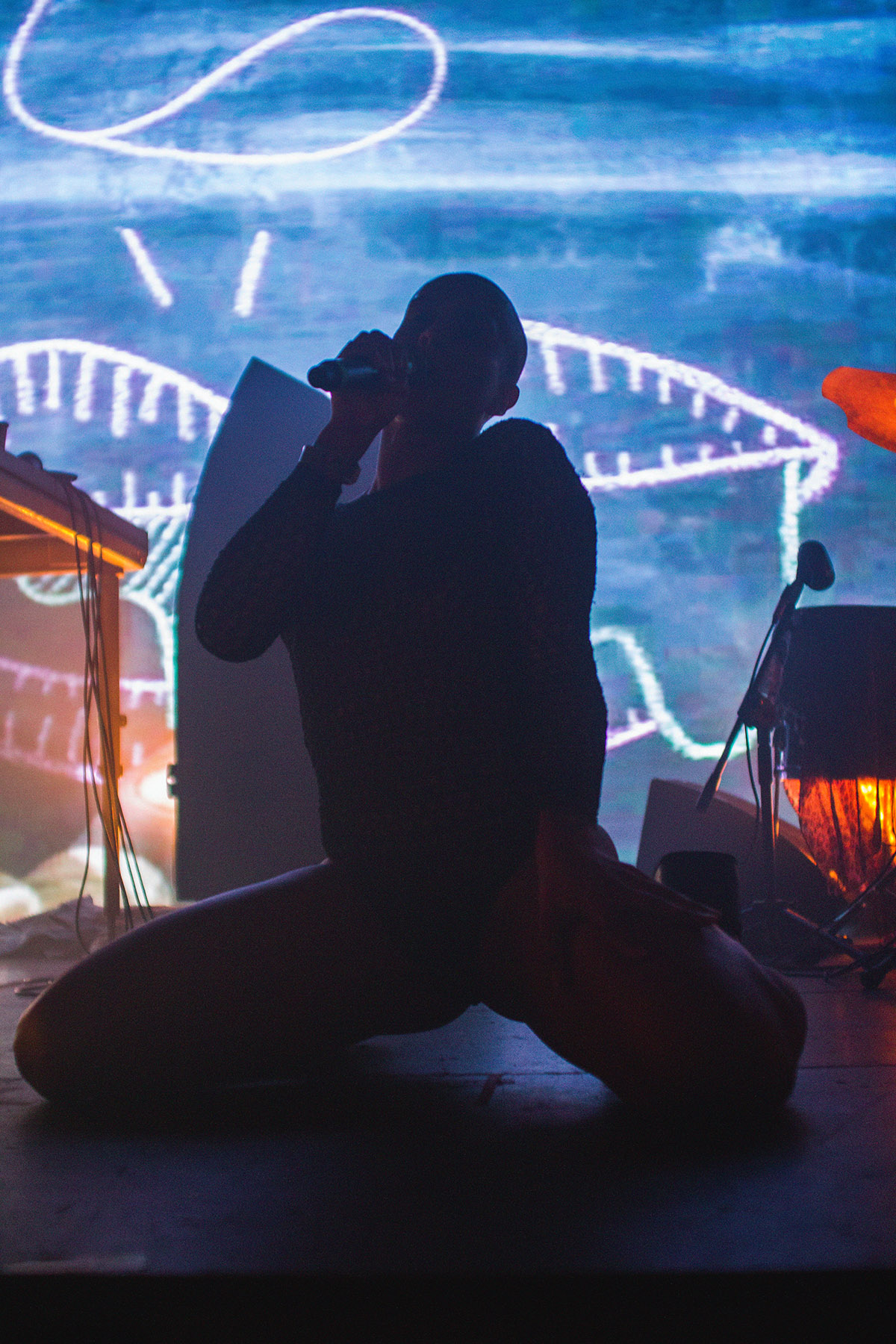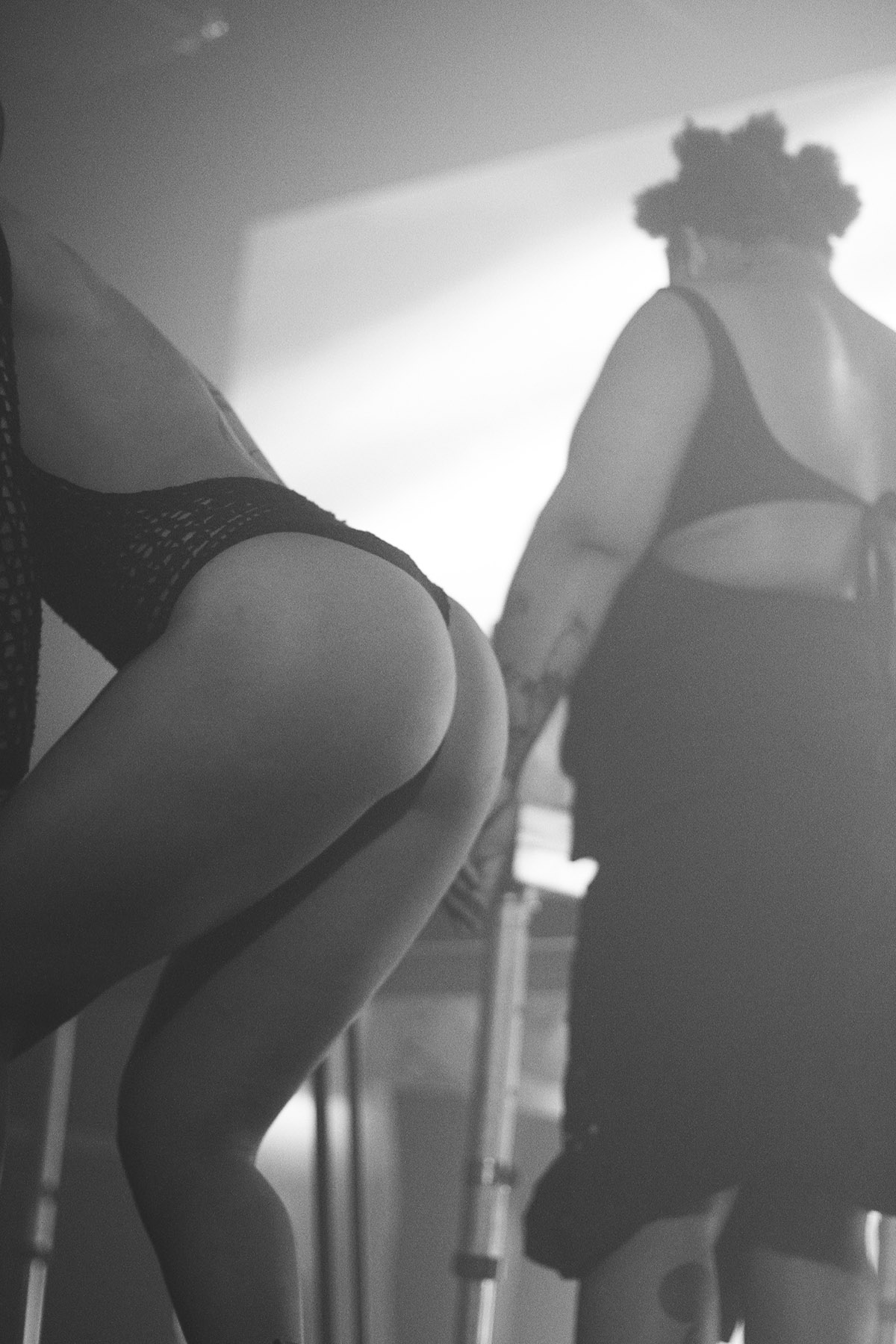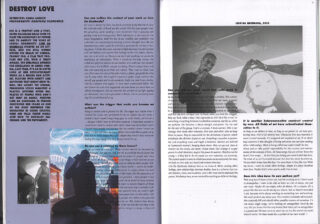She is a prophet and a poet, using Brazilian baile funk to fight the dichotomy of power and to amplify the voice of LGBTQ+ community. Linn Da Quebrada started as an actress, and she still works within the realm of cinema. Tranny Fag, a film that profiles her life, won a Teddy Award, the Berlinale awards for excellence in queer cinema, in 2018. It’s an in-depth look at her revolutionary work as a singer and activist, playing with nudity and anything that might seem taboo. Her catchy yet uncompromising lyrics manifest a playful attitude often displayed by people who don’t get hurt so easily. Meeting Linn Da Quebrada in person confirmed her image as one of the most inspiring personalities in queer culture. Here she tells TISSUE Magazine how to demolish machismo and the patriarchy.
INTERVIEW: KASIA JAROCH
PHOTOGRAPHY: DOMINIKA FILOPOWICZ
Can you outline the context of your work as Linn Da Quebrada?
My work is about my body, my Black and trans body that has to face the political reality of Brazil and the world. With the poor people from the periphery, we’re creating a new movement that is growing and gaining more and more ground. We’re fighting for a new place in the social imagination. With the rise of our visibility and credibility, the authorities are responding by backing extreme far-right laws. We are experiencing a crisis caused by politicians paralysed by the fear of losing power. It looks like a war, a territorial fight between the new system and old traditions of a power that belongs to the rich, white, normative men and not to us. Because we don’t get anything, no access to healthcare, no information. When it comes to the hate crimes, the verbal and physical attacks on our bodies: it’s a cold war that nobody talks about, but LGBTQ+ people are dying. They’re using torture and fear and expecting us to hide and retreat. They want us dead. Last year, there was the case of Marielle Franco, a black, gay politician who was brutally killed. She fought for women’s rights, single mothers like herself, gay people and favela residents. Sadly she died from a bullet, shot by criminals who appear to have been professional killers. We don’t know for sure what happened, because there has never been an official investigation. She has become the symbol of our fight against Jair Bolsonaro, the current president of Brazil, who is constantly fuelling the hatred directed at us.
What was the trigger that made you become an activist?
Trying to survive and to protect my life. The trigger was maybe when I realised that it was even prohibited for me to explore my own body. I started to teach myself foreign languages, to study theatre, performance — because I didn’t want to feel alone anymore. I desperately wanted to use all these media to connect with others. Music was the medium where I found those people and that was also the medium where I found my voice. I’m sure that there are many others who would like to speak out as well, but for some reason they can’t. Maybe they need to hear someone leading the way, saying what they always wanted to say.
Do you see a solution to these issues?
To get us closer to a solution, these matters need to be discussed by lots of people, not just me. Still, for me, it would be mostly about the redistribution of power. Givng access to power to people who have never had it. An equal distribution of privileges, which includes access to information. This influences the way we relate to other people. Talking about Brazil, we’re talking about basic needs — access to healthcare, to education, university, better food. In a place where I’ve lived all my life, the precarious suburbs of São Paulo, the life expectancy of a trans woman is roughly half of a cis person’s. I want people to live without fear, to walk on the street and not be afraid of being violated, bullied at school, getting fired. We want to survive despite all these things. I’m at a stage where I think that our next step is actually a full-on civil war. It’s not and it was never peaceful here, we need to fight for power. The only people who have peace here are the white middle- and upper-classes. They are the people who define what peaceful is, but there has never been peace for us. This violence has always existed, because they want us silent. Either we take the next step or we go back into hiding. We have to fight for things to change or they will just stay the way they are.

Can you tell me more about how your work is connected to your body?
To me, both our work and our bodies are religious entities. This context of religion is important because I like to think that our music is sacred and that our show is like a religious mass. We celebrate the body, our lives and our group. And we definitely celebrate the feminine. According to a UN report, a woman is assaulted every 15 seconds in São Paulo, and that city isn’t a unique case. In Brazil, when you look like a faggot, they say ‘look, what a sissy’, they stigmatise us with ‘do it like a man’ or something. Everything feminine is related to weakness, but for us, when we perform, the feminine is about strength and power. For me and for the rest of the group, God is a woman. A trans women. This is our strategy. Men made their networks, their laws and other rules to keep them in power. They’re responsible for the dichotomy of power, which introduces the division based on sex. Everything masculine is powerful, and everything weak and fragile is feminine. Women are referred to ‘someone’s woman’, keeping them down. Men can go out, stare at women on the streets, use them. Violate them. Our strategy is to give power to what’s feminine, to give this power to women. They too can be strong — if they feel it. So we create our own networks, our economy. The current system is one in which love seems to be exclusively for men; it’s built on men who are loved and women who love.
Linn Da Quebrada destroys love as we know it. We’re creating other feelings, new relationships between bodies. Love is a scheme that creates families, cities, and countries. Love is the main tool to maintain this power. We destroy love, so we can build everything on different feelings.
It is another heteronormative construct created by men. All fields of art have subordinated themselves to it.
As long as we believe in love, as long as we protect it, we keep protecting men. First of all: destroy love. Obviously, love was invented, it never existed naturally. It’s imagined and imposed on us. If we don’t trap ourselves in this thought of loving someone, we can start creating other relationships. What is being called love wasn’t made for me.
Music and art take partial responsibility for the creation and maintenance of the concept of love. All those songs that are written ‘from the heart’, love songs … To feel that you belong you need to feel that love. Yet most of us are frustrated because that love has never touched us. We just don’t know love like that. I’ve never been in love like that! With my music, I want to create other feelings. Maybe it’s about freedom from love. Maybe that’s when you’re really free to love.

Does this idea have its own anthem yet?
That song hasn’t been written yet, but I’m working on it. I don’t want to monopolise. I want to be able to listen to a lot of voices, not just one voice. Maybe it’s an empty echo of silence. Or a scream. Or a prayer like the one we do during our shows. But we haven’t recorded it yet, because we’re always working on something new and evolving. We won’t protect any status quo. Our creation incarnates destruction. We constantly kill and rebuild other possible versions of ourselves. It’s not about single songs, we’re working on armageddon here! By the way: did you know that the only female that takes part in armageddon is a prostitute? All men come to arrest her so that the end of the world doesn’t come. We have made her a symbol of our new world.
Visitez:
https://www.linndaquebrada.com
https://www.instagram.com/linndaquebrada/
×

Article originally published in TISSUE Magazine N°666FFF in 2019. Buy one of the last 19 copies available here: https://kiosk.international/store/

